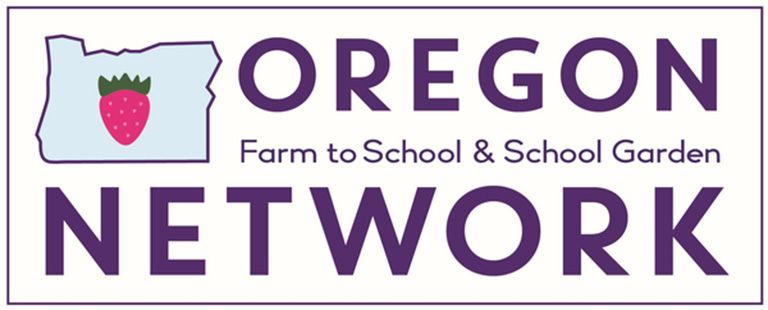Resources for Educators
Starting + Sustaining a School Garden
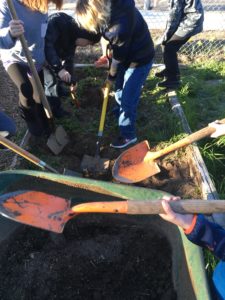
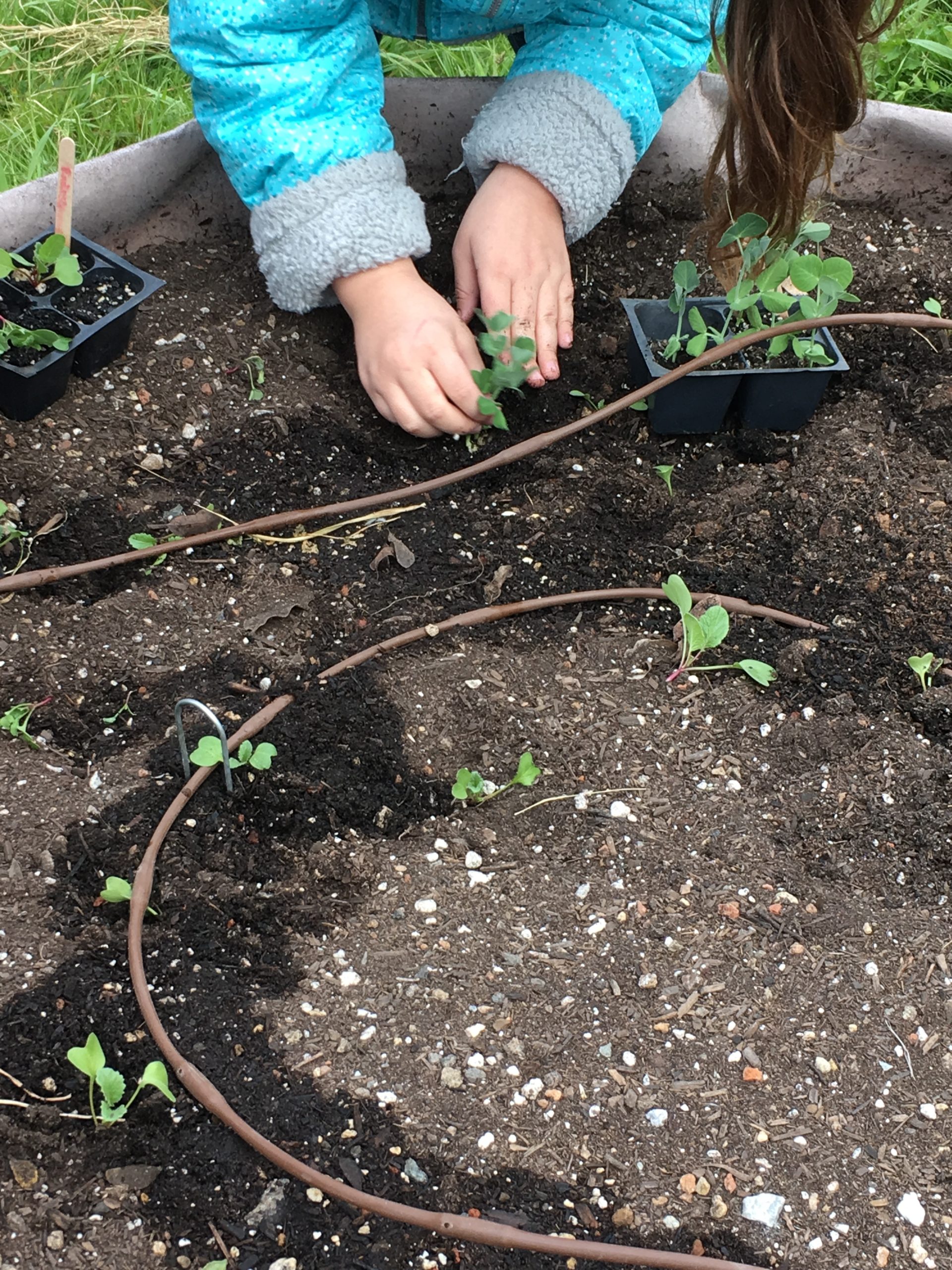
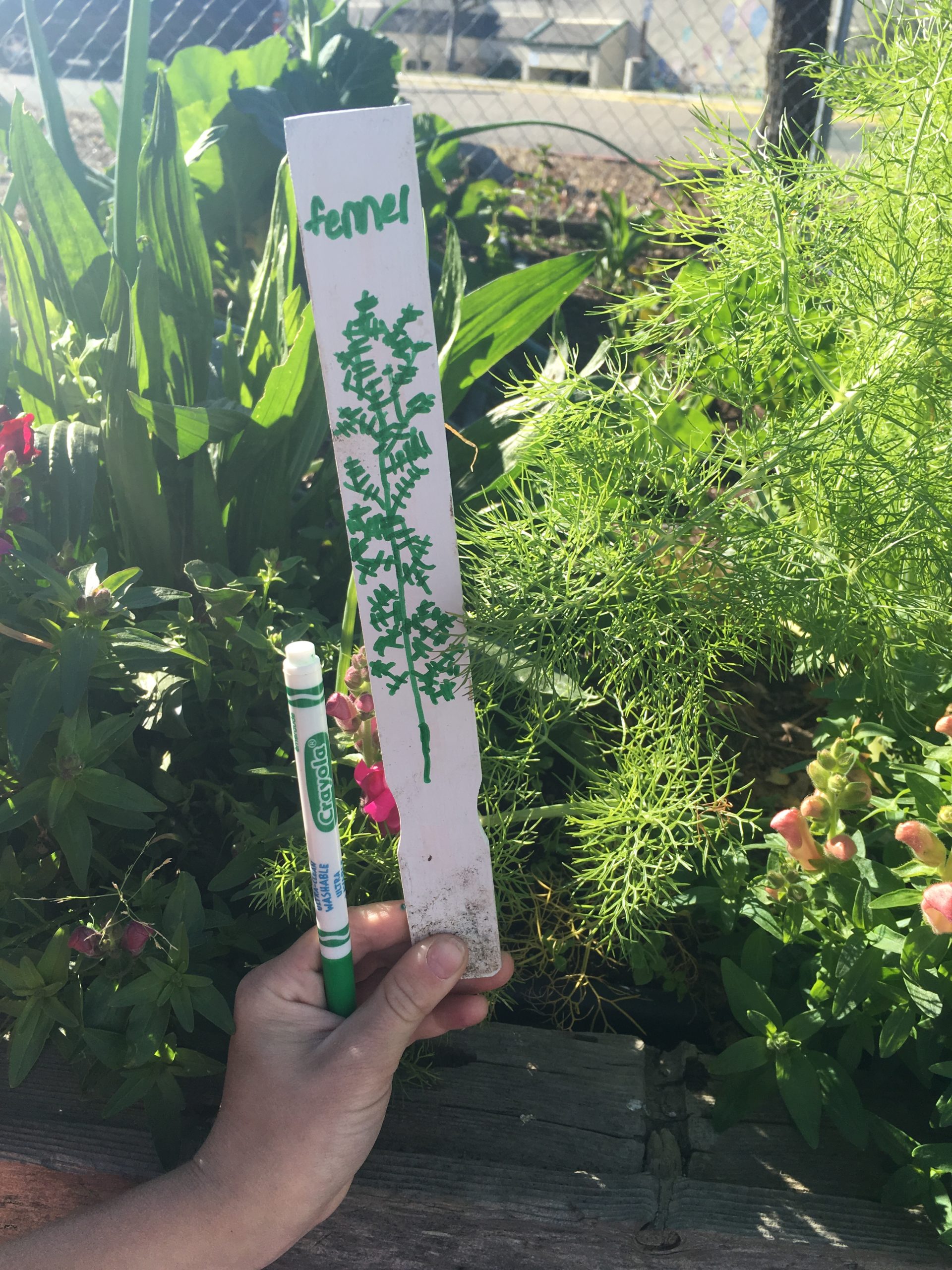
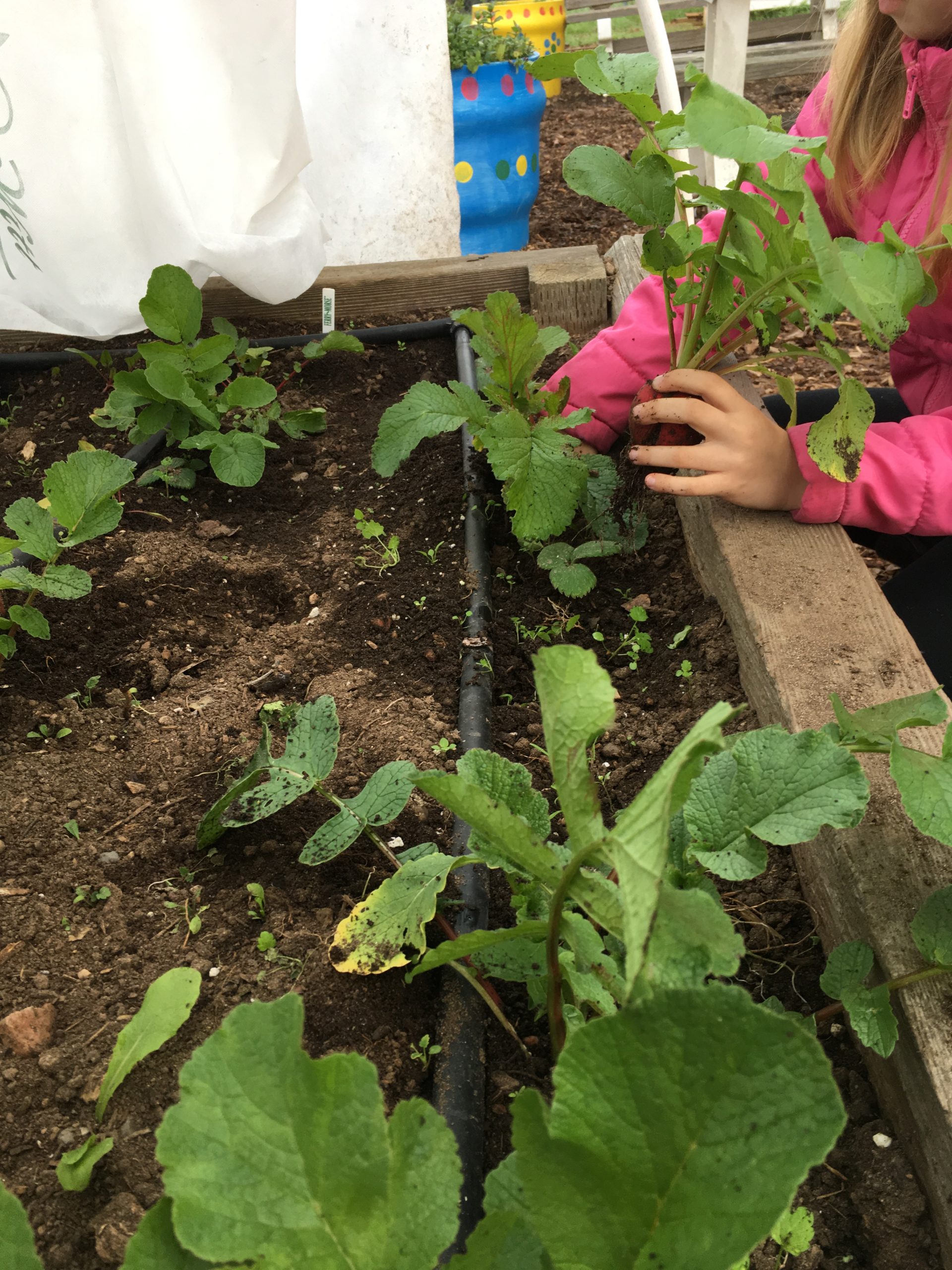
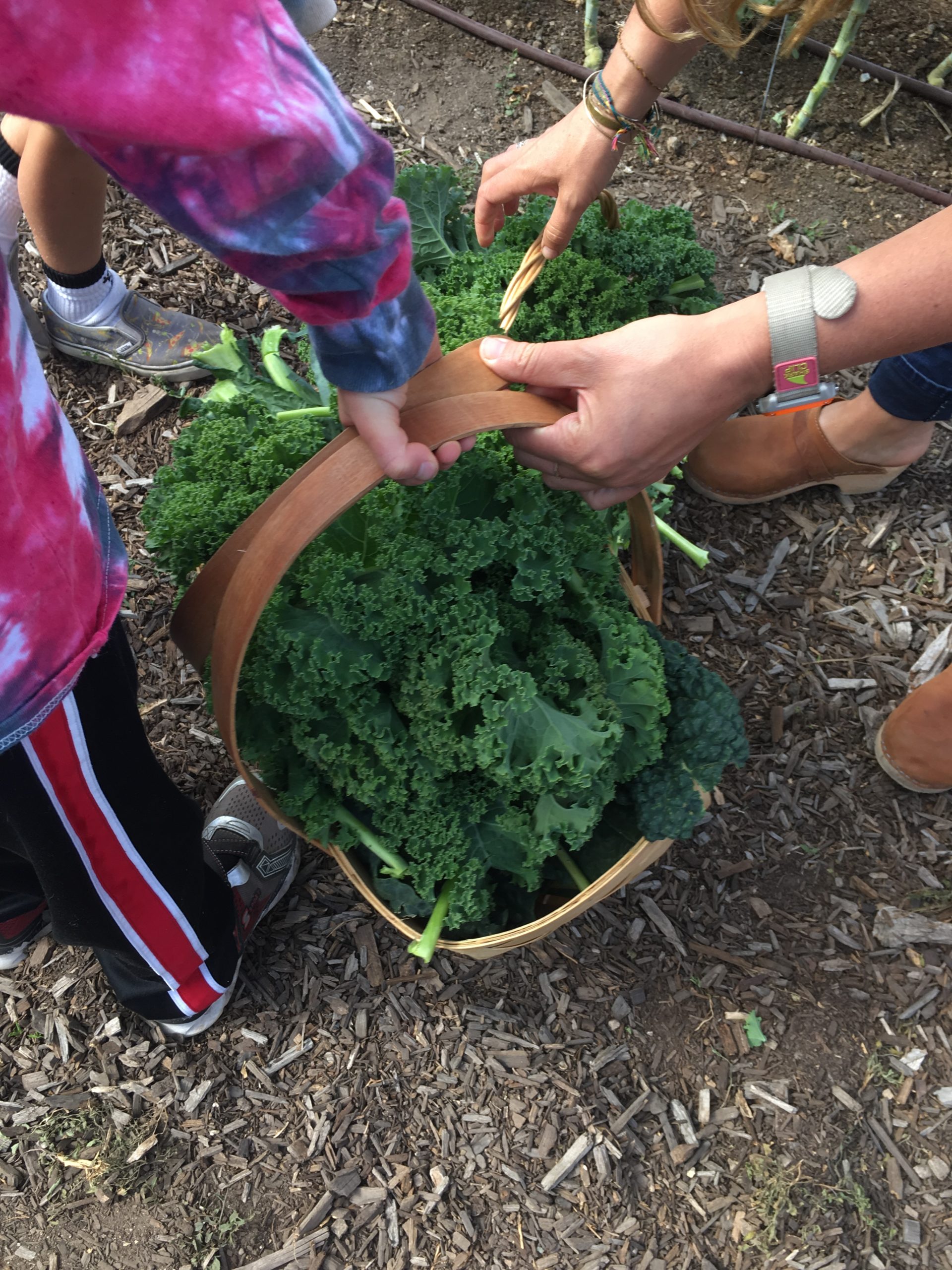
Often the most important resource for securing funding and support from administrators, parents, and educators is providing research on the benefits of garden education. Research is split into Making the case for: 1) Academic/ learning outcomes, 2) Fruit and Vegetable Intake, 3) Impact of Funding on School Garden Programs and Community Health. Also included are non-academic, peer reviewed informational resources
Academic/ Learning Outcomes
The Impact of Garden-Based Learning on Academic Outcomes in Schools Synthesis of Research Between 1990 and 2010
- Authors: Dilafruz R. Williams and P. Scott Dixon, Portland State University, Review of Educational Research, June 2013. 83: 211-235.
- Objective: To determine the impact of garden-based learning on academic outcomes in schools
- Outcomes: The synthesis results showed a preponderance of positive impacts on direct academic outcomes with the highest positive impact for science followed by math and language arts. Indirect academic outcomes were also measured with social development surfacing most frequently and positively. These results were consistent across programs, student samples, and school types and within the disparate research methodologies used.
- Results: These results were consistent across programs, student samples, and school types and within the disparate research methodologies used
- Conclusions
- Caveats/Notes
http://rer.sagepub.com/content/83/2/211
Planting the Seeds for Nature-Based Learning: Impacts of a Farm- and Nature-Based Early Childhood Education Program
- Authors; Kylie Rymanowicz, Chelsea Hetherington, Brooke Larm
- Objective: Farm- and nature-based early childhood education programs have a unique potential to provide young children with skills and experiences that build a strong foundation for future learning and environmental stewardship, but can also extend positive impacts to families. In this paper, the researchers work to bridge the gap between research and practice by presenting a description and program evaluation of the Farm Sprouts farm-based preschool program
- Outcomes: The results of this program evaluation suggest that quality farm- or nature-based programs can positively impact a child’s language and conversation skills, increase their interest in nature and desire to explore, and positively impact family interactions
Science in the Learning Gardens: Factors that Support Racial and Ethnic Minority Students' Success in Low-Income Middle Schools; National Science Foundation Award: 2014-2017 (Portland State Univ.)
- Authors: Dilafruz Williams: Contact: williamsdi@pdx.edu; Co-PIs: Sybil Kelley, Cary Sneider, Ellen Skinner
- Background: Science in the Learning Gardens (SciLG) uses school gardens as the context for learning at two low-income middle schools serving predominantly racial and ethnic minority students in Portland, Oregon. SciLG brings underrepresented youth into gardens at a critical time in their intellectual development with the goal of broadening the factors that support their motivation to pursue STEM careers and educational pathways.
- Design: Grounded in self-determination theory, this longitudinal study measured students’ perceptions of belonging, competence, autonomy, and engagement in gardening experiences, and teacher-reports of students’ re-engagement, to predict four science outcomes: engagement, learning, science grades, and academic identity in science
- Results: Findings suggest that garden-based activities show promise for increasing students’ engagement and learning in science, and in fostering students’ long-term interest in pursuing science.
Two 3-minute videos about the project are available at: http://resourcecenters2015.videohall.com/presentations/542 and http://stemforall2017.videohall.com/presentations/914. See flyer: https://sites.google.com/a/pdx.edu/science-in-the-learning-gardens-scilg/
More info available soon at https://sites.google.com/a/pdx.edu/science-in-the-learning-gardens-scilg/
The Child in the Garden: An Evaluative Review of the Benefits of School Gardening
- Authors; The Journal of Environmental Education, Dorothy Blair (2009)
- Objective: Although educators widely use school gardens for experiential education, researchers have not systematically examined the evaluative literature on school-gardening outcomes. The author reviewed the U. S. literature on children's gardening, taking into account potential effects, school-gardening outcomes, teacher evaluations of gardens as learning tools, and methodological issues.
- Outcomes: Quantitative studies showed positive outcomes of school-gardening initiatives in the areas of science achievement and food behavior, but they did not demonstrate that children's environmental attitude or social behavior consistently improve with gardening. Validity and reliability issues reduced general confidence in these results. Qualitative studies documented a wider scope of desirable outcomes, including an array of positive social and environmental behaviors. Gardening enthusiasm varies among teachers, depending on support and horticultural confidence.
https://naaee.org/eepro/research/library/child-garden-evaluative-review-benefits
https://www.tandfonline.com/doi/abs/10.3200/JOEE.40.2.15-38
Fruit and Vegetable Intake
Increasing Fruit and Vegetable Intake among Children and Youth through Gardening-Based Interventions: A Systematic Review
- Authors: Mateja R Savoie-Roskos, Heidi Wengreen, Carrie Durward
- Objective: The purpose of this review was to identify the effectiveness of gardening interventions that have been implemented to increase Fruit/Veg consumption among children
- Outcomes: Most studies suggest a small but positive influence of gardening interventions on children's F/V intake
https://pubmed.ncbi.nlm.nih.gov/27964852/
School-based gardening, cooking and nutrition intervention increased vegetable intake but did not reduce BMI: Texas sprouts - a cluster randomized controlled trial
- Authors; Jaimie N. Davis, Adriana Pérez, Fiona M. Asigbee, Matthew J. Landry, Sarvenaz Vandyousefi, Reem Ghaddar, Amy Hoover, Matthew Jeans, Katie Nikah, Brian Fischer, Stephen J. Pont, Daphne Richards, Deanna M. Hoelscher & Alexandra E. Van Den Berg (2021)
- Objective: The goal of this study was to evaluate the effects of a one-year school-based gardening, nutrition, and cooking intervention (called Texas Sprouts) on dietary intake, obesity outcomes, and blood pressure in elementary school children.
- Participants: 3135 students, median age 9.2 years
- Results: While this school-based gardening, nutrition, and cooking program did not reduce obesity markers or blood pressure, it did result in increased vegetable intake.
https://ijbnpa.biomedcentral.com/articles/10.1186/s12966-021-01087-x
School Gardens Enhance Academic Performance and Dietary Outcomes in Children
- Authors; Claire K. Berezowitz EdM, Andrea B. Bontrager Yoder MM, PhD, Dale A. Schoeller PhD (2015)
- Objective: Schools face increasing demands to provide education on healthy living and improve core academic performance. Although these appear to be competing concerns, they may interact beneficially. This article focuses on school garden programs and their effects on students' academic and dietary outcomes.
- Conclusions: This small set of studies offers evidence that garden‐based learning does not negatively impact academic performance or FV consumption and may favorably impact both.
School gardens: an experiential learning approach for a nutrition education program to increase fruit and vegetable knowledge, preference, and consumption among second-grade students.
- Authors: Parmer SM, Salisbury-Glennon J, Shannon D, Struempler B. (2009)
- Objective: To examine the effects of a school garden on children's fruit and vegetable knowledge, preference, and consumption
- Design: Self-report questionnaires, interview-style taste and rate items, lunchroom observations.
- Outcomes:School gardens as a component of nutrition education can increase fruit and vegetable knowledge and cause behavior change among children. These findings suggest that school administrators, classroom teachers, and nutrition educators should implement school gardens as a way to positively influence dietary habits at an early age.
https://pubmed.ncbi.nlm.nih.gov/19411056/
The Effects of School Garden Experiences on Middle School–Aged Students’ Knowledge, Attitudes, and Behaviors Associated With Vegetable Consumption
- Authors; Ratcliffe, Michelle & Merrigan, Kathleen & Rogers, Beatrice & Goldberg, Jeanne. (2009).
- Objective: This study describes the effects of garden-based education on children's vegetable consumption.
- Design: cross-sectional
- Participants: 236 students complete the Garden Vegetable Frequency Questionnaire and 161 complete a taste test
- Outcomes: Results indicate that school gardening may affect children's vegetable consumption, including improved recognition of, attitudes toward, preferences for, and willingness to taste vegetables. Gardening also increases the variety of vegetables eaten.
https://kohalacenter.org/HISGN/pdf/HPP_2011_MMR_Sample1.pdf
Garden-Based Nutrition Education Affects Fruit and Vegetable Consumption in Sixth-Grade Adolescents
- Authors; Jessica D.McAleese, MPHLinda L.Rankin, PhD, RD, FADA (2007)
- Objective: The purpose of this study was to investigate the effects of garden-based nutrition education on adolescents’ fruit and vegetable consumption using a nonequivalent control group design
- Outcomes: A repeated-measures analysis of variance showed that adolescents who participated in the garden-based nutrition intervention increased their servings of fruits and vegetables more than students in the two other groups. Significant increases were also found in vitamin A, vitamin C, and fiber intake
https://www.sciencedirect.com/science/article/abs/pii/S0002822307000144
Impact of Garden-Based Youth Nutrition Intervention Programs: A Review
- Authors; Ramona Robinson-O’Brien, PhD, RD, Mary Story PhD, RD, Stephanie Heim MPH (2009)
- Objective:Garden-based nutrition-education programs for youth are gaining in popularity and are viewed by many as a promising strategy for increasing preferences and improving dietary intake of fruits and vegetables. This review examines the scientific literature on garden-based youth nutrition intervention programs and the impact on nutrition-related outcomes.
- Outcomes: Findings from this review suggest that garden-based nutrition intervention programs may have the potential to promote increased fruit and vegetable intake among youth and increased willingness to taste fruits and vegetables among younger child
https://jandonline.org/article/S0002-8223(08)02044-0/fulltext
Do Farm-to-School Programs Make a Difference? Findings and Future Research Needs
- Authors: Anupama Joshi, MS Andrea Misako Azuma, MS Gail Feenstra, EdD, RD (2008)
- Goal: Farm-to-school programs are increasing in number across the United States, yet research and evaluation of programs is limited, with only a few studies published in refereed journals. For this article we reviewed 38 studies and report on 15 studies that met the inclusion criteria.
- Conclusions: These preliminary findings are related to the impacts of farm-to-school programs on behavior of students, school teachers and administrators, food service, farmers and producers, and parents, as well as knowledge gains and attitudinal changes. Evaluation study designs vary greatly, though findings consistently indicate that the farm-to-school approach results in students eating more fruits and vegetables per day in the cafeteria, classroom, or at home, making positive lifestyle changes, as well as improving knowledge and attItudes about healthy eating and sustainable agriculture
Farm to elementary school programming increases access to fruits and vegetables and increases their consumption among those with low intake
- Authors: Bontrager Yoder, A.B., Liebhart, J.L., McCarty, D.J., Meinen, A., Schoeller, D., Vargas, C. & LaRowe, T. (2014). Journal of Nutrition Education and Behavior, 46(5), 341–49.
- Objective: To assess the effectiveness of Wisconsin Farm to School (F2S) programs in increasing students' fruit and vegetable (FV) intake.
- Outcomes: Farm to School programming improved mediators of FV consumption and decreased the proportion of children with unfavorable FV behaviors at school lunch
https://pubmed.ncbi.nlm.nih.gov/24953435/
Farm-to-school education grants reach low-income children and encourage them to learn about fruits and vegetables
- Authors; Caroline B Rains, Kristen C Giombi, Anupama Joshi
- Goal: For children from low-income families, school meals are a significant portion of daily caloric intake and hence an opportunity to address food insecurity. For a variety of reasons, including children not eating school meals, participation in the National School Lunch Program remains below eligibility. Many states have pursued legislation to institutionalize programs such as farm to school that aim to improve the quality of school meals and acceptance of healthy foods (fruits and vegetables) to address the interconnected problems of food insecurity, hunger, and diet-related diseases. Oregon established its Farm to School Education Grant Program to increase knowledge of and preference for fruits and vegetables among children in low-income school districts. This article outlines the reach of the education grants and examines their influence on children’s food choices and behaviors related to fruits and vegetables. We analyzed Oregon Department of Education Farm to School Baseline and Progress Reports from school year 2015–2016 and conducted interviews with education grantees.
- Results: Thematic results included students eating fruits and vegetables, trying new foods because of gardens, and learning about growing produce. Oregon’s Farm to School Education Grant Program reached the targeted low-income students, encouraged districts to implement educational activities, and allowed low-income children to learn about produce. Education is a core element of farm-to-school success and can help achieve the behavior change in youth needed for increased acceptance of school meals, better health outcomes, and improved food security.
School Gardens: An Experiential Learning Approach for a Nutrition Education Program to Increase Fruit and Vegetable Knowledge, Preference, and Consumption among Second-grade Students
- Authors: Sondra M. Parmer, PhD; Jill Salisbury-Glennon, PhD; David Shannon, PhD; Barbara Struempler, PhD
- Objective: To examine the effects of a school garden on children’s fruit and vegetable knowledge, preference, and consumption
- Outcomes: Participants in the NE+G and NE treatment groups exhibited significantly greater improvements in nutrition knowledge and taste ratings than did participants in the CG. Moreover, the NE+G group was more likely to choose and consume vegetables in a lunchroom setting at post-assessment than either the NE or CG groups.
- Methods: participants were assigned to one of 3 groups: (1) nutrition education and gardening (NE+G) treatment group, (2) nutrition education only (NE) treatment group, or (3) control group (CG). Both treatment groups received classroom instruction, and the NE+G group also received a school gardening experience.
- Conclusions School gardens as a component of nutrition education can increase fruit and vegetable knowledge and cause behavior change among children. These findings suggest that school administrators, classroom teachers, and nutrition educators should implement school gardens as a way to positively influence dietary habits at an early age.
https://pubmed.ncbi.nlm.nih.gov/19411056/
Impact of Funding on School Garden Programs and Community Health
Health Impact Assessment: Farm to School and School Garden Policy, HB 2800
- Authors; Henderson T., Rader M., Sorte B., Ratcliffe M.M., Lawrence A., Lucky J. et al | May 1, 2011
- Goal: From fall 2010 to spring 2011, Upstream Public Health collaborated with Farm to School and school garden stakeholders to conduct a Health Impact Assessment (HIA) on HB 2800, evaluating its potential effects on Oregonians’ health. This report summarizes the findings of that assessment
- Outcomes: Key Findings on Impact of HB 2800:
-Farm to School Reimbursements would:
Create and maintain jobs for Oregonians, Increase student participation in school’s meal programs, Improve household food security, strengthen connections within Oregon’s food economy
-Food, Garden and Agriculture Grants would:
Increase childhood food preferences for fruits and vegetables, shape long-term healthy diet choices that affect children’s learning and academic achievement while preventing obesity
A Nationwide Snapshot of the Predictors of and Barriers to School Garden Success
- Authors: Kate G. Burt, PhD, RD; Nicole Lindel BS; Jiayu Wang, BS; Marissa Burgermaster PhD; Joseph Fera PhD
- Objective: To explore the degree and predictors of and barriers to school garden integration (termed success).
- Participants: A total of 414 school gardeners from 38 states and Puerto Rico
- Results: Results indicate that success of school garden programs may be more difficult for the schools located in a rural area or in the absence of school or community-at-large interest. This study found that race/ethnicity of students and socioeconomic status are not related to success score, which is promising as other research indicates that successful school gardens may be especially impactful for low-income people of color. Causal research is needed to identify strategies that increase school garden success, with a focus on engaging key stakeholders (administrators, teachers, parents, the community at large, and garden coordinators).
https://www.sciencedirect.com/science/article/abs/pii/S1499404619309078
Predictors of School Garden Integration: Factors Critical to Gardening Success in New York City
- Authors: Burt, Kate Gardner; Burgermaster, Marissa; Jacquez, Raquel. Journal of Health Education & Behavior
- Objective: The purpose of this study was to determine the level of integration of school gardens and identify factors that predict integration
- Results: The results of this study indicate that any garden can become well integrated, as budget is a modifiable factor. When adequate funding is secured, a well-integrated garden may be established with proper planning and sound implementation.
https://eric.ed.gov/?id=EJ1196865
The carry-over effects of school gardens on fruit and vegetable availability at home: A randomized controlled trial with low-income elementary schools
- Authors: Nancy M Wells 1, Beth M Meyers 2, Lauren E Todd 2, Charles R Henderson Jr 3, Karen Barale 4, Brad Gaolach 5, Gretchen Ferenz 6, Martha Aitken 4, Caroline C Tse 6, Karen Ostlie Pattison 7, Laura Hendrix 8, Janet B Carson 8, Cayla Taylor 9, Nancy K Franz 10
- Objective: This group-randomized controlled trial examines the effects of a school garden intervention on availability of fruits and vegetables (FV) in elementary school children's homes
- Outcomes: The garden intervention led to an overall increase in availability of low-fat vegetables at home. Among younger children (2nd grade at baseline), the garden intervention led to greater home availability of vegetables, especially, low-fat vegetables. Moreover, for the younger group, garden intervention fidelity (GIF) or robustness predicted home availability of fruit, vegetables, and low-fat vegetables.
- Conclusions: School gardens have potential to affect FV availability in the home environment.
https://pubmed.ncbi.nlm.nih.gov/29627512/
Additional School Garden Reading + Literature Reviews and Databases
1. USDA Office of Community Food Systems Farm to School Literature Review And Farm to School Literature Review Summary The literature review included U.S.-focused, peer-reviewed literature published from January 2010 to December 2019, as well as book chapters, pamphlets, magazine articles, and reports from non-profit organizations and governmental departments. Here are select highlights of the key findings:
- Definitions of “local” varied, but most often “local” food referred to food grown within the State.
- Studies found increasing nationwide participation in farm to school, encompassing many types of activities.
- Studies found some associations between farm to school programs and students’ knowledge.
- Despite barriers, school meal programs increased spending on local foods and used a range of strategies to purchase local products.
- School procurement of local foods added investment in local economies and supported food and agriculture producers.
- More research on farm to school program implementation and impacts is necessary.
Objective 1: Identify and describe the economic contribution of farm to school and procurement processes across various geographies; • Objective 2: Assess the impacts of farm to school efforts on food growing, serving, and purchasing on schools, districts or SFAs; and • Objective 3: Identify and describe how farm to school programs and activities have impacted changes in policy.
2. Williams, D., & Brown, J. (2012). Learning Gardens and Sustainability Education: Bringing Life to Schools and Schools to Life. New York, NY: Routledge.
3. Rogue Valley Farm to School has compiled an extensive list of books (including a selection for younger readers) and films about food, farming, eating, and agriculture:
4. Growing Gardens has list of books and other resources, including a list of Spanish-language garden resources
5. Western Growers Foundation has compiled peer-reviewed articles that support the value and purpose of school gardens.
6. Life Lab hosts a collection of summary documents and peer reviewed article databases related to the value of garden-based education. LifeLab has also published a literature review: Student Learning Outcomes of Garden-Based Education
7. The National Farm to School Network hosts a resource database (search key terms: Farm-based education ; data, statistics & reports; peer reviewed articles
8. Edible Schoolyard has compiled a literature review of academic studies demonstrating the positive impacts of school garden and farm-to-school programs organized by topics including: academic performance, fruit/vegetable consumption, attitudes towards math and science learning, etc
9. KidsGardening.org's Benefits of School Gardens: A collection of academic writing on the impacts and benefits of school garden programs, organized by academic, environmental attitudes, social, nutrition and health.
10. Edible Schoolyard Literature Summaries: Benefits of Edible Education
Additional Commonly Referenced Resources (not peer reviewed research)
- National Farm to School Network: Farm to School Benefits of School Gardens one-pager
- Rogue Valley Farm to School: School Garden Benefits During COVID-19, | Los Beneficios Del Huerto Escolar en Tiempos de COVID-19
- USDA Blog Post: Research Shows Farm to School Works
- Journal of Hunger and Environmental Nutrition Article Do Farm-to-School Programs Make a Difference? Findings and Future Research Needs
- SlowFood: Benefits of School Gardens one-pager
- Cornell University: Benefits of Garden-Based learning
- USDA short video: Celebrate National Farm to School Month
- Growing Gardens: Portland School Garden Assessment, Dec 2016 In 2016, Growing Gardens completed a regional survey of 144 schools in the Portland area to understand the breadth of school gardens, how they are used and by who. Through an online survey and follow up site visits, the study documents how school garden programs are organized, funded and sustained. It includes recommendations for school districts, administrators, teachers, volunteers and nonprofits, as well as profiles of 64 school gardens.
There are so many guides to starting a school garden out there! Here is a list of some favorites
•Oregon Department of Education: Getting Started with School Gardens
•Louisiana State University Ag Center: Steps to Growing a Successful School Garden
• Rooted: Plants Want to Grow: Garden Basics for Beginners
•LifeLab: Getting Started, A Guide for Creating School Gardens as Outdoor Classrooms
Oregon has a variety of climates and growing zones! Check out these planting guides to figure out what to plant when
•OSU Extension Vegetable Planting Calendar ~ Central Oregon
•Oregon Tilth Planting Calendar ~ West of Cascades
•Siskiyou Seeds Planting Calendar ~ South West Oregon
•Farmers Almanac Planting Calendar ~ statewide
•OSU Extension Vegetable Gardening in Oregon Guide
•Growing Your Own - Oregon gardening guide published by OSU with monthly planting guidelines by region (page 7-8), followed by region-specific information (page 19-24)
•Growing Vegetables in Central Oregon - Page 12-13 has a guide for planting by soil temperature (get a soil thermometer!) which can help you plant for your region
•Central Oregon Vegetable Garden Calendar - General guidelines for when to plant certain crops in climates with shorter growing seasons
•Create a School Garden Planting Calendar - New resource & lesson plan (K-3) from Kids Gardening
•Interactive Spring Planting Calendar
Additional Planning Calendar Templates:
- Circular Calendar from Growing Gardens
- Spreadsheet Calendar from Growing Gardens
Get connected in gardening! This is a list of statewide and national garden educator groups with which to brainstorm, resource share and collaborate
Oregon Farm to School and School Garden Network (OFSSGN)
The OFSSGN email lists 900 Farm to School and School Garden educators and stakeholders. Information about grants, trainings, regional and state-wide events and other resources are shared on this list. There is also a sublist for garden educators. Please subscribe to both lists.
To subscribe to the main OFSSGN email list go to: https://npogroups.org/lists/info/ofssgn
To subscribe to the garden educators list: https://npogroups.org/lists/info/ofssgngardeneducators
Questions? Contact melina@oregonfarmtoschool.org
Portland Farm and Garden Educators Network (PFGEN)
This group is focused on farm and garden education in the Portland metro area. It is an active list of over 200 members to share information, resources, tips and ideas, and there are sometimes garden site visits for members.
Sign up: https://groups.google.com/forum/#!forum/PFGEN or contact anna@growing-gardens.org
Lane Garden Educators List
The Lane Garden Educators is a group of garden educators in Lane County who meet once a year to share resources and collaborate. Sign up: info@schoolgardenproject.org
National Farm to School Network
The National Farm to School Network sends monthly newsletters featuring Farm to School activities from all fifty states. If you want to stay updated on nation-wide policies, conferences, and news related to farm to school and school garden activities, sign up at the National Farm to School Network’s website at www.farmtoschool.org > “Resources” > “Newsletter.”
School Garden Support Organization Network
The School Garden Support Organization Network is made up of organizations and individuals that support multiple school garden programs at a regional, school district, or state level. By sharing resources and encouraging dialogue among school garden support professionals we hope to eliminate redundancy and help facilitate regional-based school garden program development. The network hosts a discussion forum for garden educators.
Sign up for the discussion forum here: https://www.sgsonetwork.org/forum/
Summer can be a tricky time in the garden. Here are some guides and tips for sustaining your school garden in the summer
Summer in the Garden by two former AmeriCorps members, Pritha Golden and Karin Pfeiffer-Hoyt, is an excellent resource for maintaining a school garden in the summer months: http://growing-gardens.org/wp-content/uploads/2013/03/Summer-in-the-School-Garden-A-Resource-for-Working-with-Volunteers-to-Maintain-your-School-Garden.pdf
Sample Summer Garden Caretaker Instructions is a document by FoodCorps service member Finley Tevlin. Use this guide to customize instructions for your summer garden caretakers
Starting a school garden can take a village! Here are some organizations throughout Oregon who serve multiple school gardens
School Garden Project (SGP) of Lane County
SGP offers a variety of support service resources to help schools develop, maintain, and use their on-site gardens. These include starts and seeds; in-person, email, and telephone consultation; in school and after school garden-based science education; and, workshops for teachers and volunteers.
info@schoolgardenproject.org, or http://schoolgardenproject.org/
Food Roots (Tillamook)
Food Roots works to improve the diets and eating behaviors of school-aged children, and support the local agricultural economy, by reconnecting students and school communities to local agriculture and the food they eat. They operate two school gardens and work with other community and school garden groups to form a network of garden projects to leverage resources and improve results.
office@foodrootsnw.org or http://www.foodrootsnw.org/farm-to-school/
Rogue Valley Farm to School (Jackson (direct support) and Josephine Counties)
Rogue Valley Farm to School educates children about our food system through hands-on farm and garden programs, and by increasing local foods in school meals. They support school gardens throughout the Rogue Valley. The Digging Deeper School Partnership program includes direct school garden education, teacher professional development, cafeteria tasting tables and farm field trips. RVF2S supports schools in purchasing local produce, facilitating sourcing from local producers.
Rebecca Slosberg, rebecca@rvfarm2school.org or https://www.rvfarm2school.org/
Corvallis Environmental Center
They operate the Farm to School program for Corvallis, and have youth programs that engage children in the garden, in the classroom, and virtually. farmtoschool@corvallisenvironmentalcenter.org https://www.corvallisenvironmentalcenter.org/
FoodWaves (Clackamas County)
FoodWaves cultivates food justice and access to healthy food in Clackamas County and the surrounding communities. They provide school garden education as well as building and managing raised bed gardens at businesses, community centers, and homes.
Matt Brown, matt@foodwaves.org or www.foodwaves.org
The Environmental Center (Central Oregon)
The Garden For Every School program connects youth to nature through food and garden-based education. We provide lessons in classrooms, school gardens, cafeterias and in our Kansas Avenue Learning Garden. We also facilitate a network of trained garden educators, support creation and sustaining of school gardens with local grants, provide technical assistance to schools, and identify institutional opportunities through district collaboration.
Denise Rowcroft, denise@envirocenter.org or www.envirocenter.org/schoolgardens
Grow Portland
Grow Portland is a nonprofit that supports schools and communities by facilitating hands-on garden experiences that foster connections to food, nature and people.
Grow Portland teaches experiential, culturally responsive garden education to elementary students during the school day. In 2021 Grow Portland partnered with 10 Title 1 elementary schools in the Portland Metro area, serving over 4,000 students. Garden Educators work closely with classroom teachers, families, and students to grow and tend school gardens- promoting food and ecological literacy, social emotional learning, and appreciation for nature.
During 2020 school closures Grow Portland grew and harvested over 3,500 pounds of fresh produce in 10 school gardens and donated that produce back to school nutrition services and food pantries.
Michelle Welton, mwelton@growportland.org or https://www.growportland.org/
Growing Gardens
Portland-based nonprofit works with school partners to develop and implement school garden programs, including school day classes tied to core curriculum, afterschool Garden Clubs, and community involvement. Growing Gardens coordinates a School Garden Coordinator Certificate Training which will be run online through OSU in 2021. Growing Gardens is a regional education hub for Oregon Farm to School and School Garden Network and facilitates the Portland Farm and Garden Educators Network. In addition to school gardens, Growing Gardens supports low-income families in establishing home gardens and teaches gardening in correctional institutes across Oregon.
Anna Garwood, anna@growing-gardens.org or www.growing-gardens.org
Here are some additional National Service Organizations currently serving in school gardens across Oregon:
FoodCorps
FoodCorps is a nationwide service program that connects kids to healthy food in school, so they can lead healthier lives and reach their full potential. FoodCorps Oregon is hosted by the Oregon Department of Agriculture. 10 FoodCorps service members currently serve as food and garden educators in ten Oregon communities. Members serve in school communities where over 50% of all students are eligible for free or reduced price meals. FoodCorps service members provide students with hands-on gardening, nutrition and cooking education, during in-class lessons, after school, and in summer enrichment programs.
For questions about FoodCorps programming in Oregon, information on becoming a FoodCorps service site, or applying to be a FoodCorps service member, contact FoodCorps Oregon Fellow Aaron Poplack: aaron.poplack@foodcorps.org.
Visit online at: https://foodcorps.org/apply/where-youll-serve/oregon/
AmeriCorps
AmeriCorps is a national service organization that places over 70,000 Americans each year in intensive service to meet community needs, through placements with non-profits, public agencies, and community organizations. AmeriCorps volunteers are available for Oregon school garden projects through these host organizations, and maybe others as well. The cost to host a member for a year varies by program.
RARE: The mission of the RARE Program is to increase the capacity of rural communities to improve their economic, social, and environmental conditions, through the assistance of trained graduate-level participants, from across the US. RARE participants assist communities in the development and implementation of projects for achieving a sustainable natural resource base and improving rural economic conditions. The RARE program has placed more than 500 volunteers and served every Oregon county
Please contact RARE Program Coordinator, Titus Tomlinson, for more information about partnering with the RARE Program: titust@uoregon.edu. Or visit us online at: https://rare.uoregon.edu/
Confluence Environmental Center (Portland area):
Confluence AmeriCorps Members address critical environmental needs related to energy and resource conservation, healthy watersheds, outdoor environmental education, and garden-based education. Confluence Members focus on low-income communities and communities of color, as these populations are most affected by social and environmental inequities.
For more information about applying for an 11-month AmeriCorps Member position, contact Sherrie Jackson, Operations Coordinator at sjackson@confluencecenter.org
Pest and weed management is often a necessary part of managing a school garden! However, working with edible crops and youth means considerations need to be taken with pesticide/herbicide use.
Check out the following Integrated Pest Management (IPM) resources for how to mitigate these pests and weeds safely!
•Consumer Notice hosts a page "Alternatives to Roundup" that has school garden crossover
•ODA has a "School Integrated Pest Management" page with resources ranging from low-impact pesticides to record keeping to state law updates
